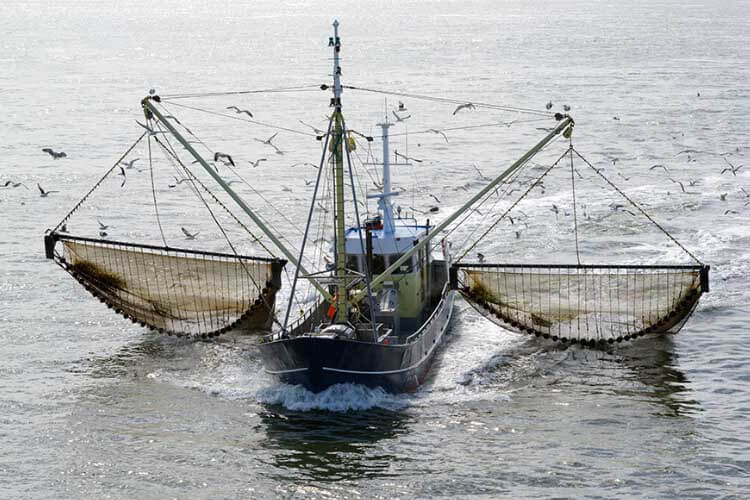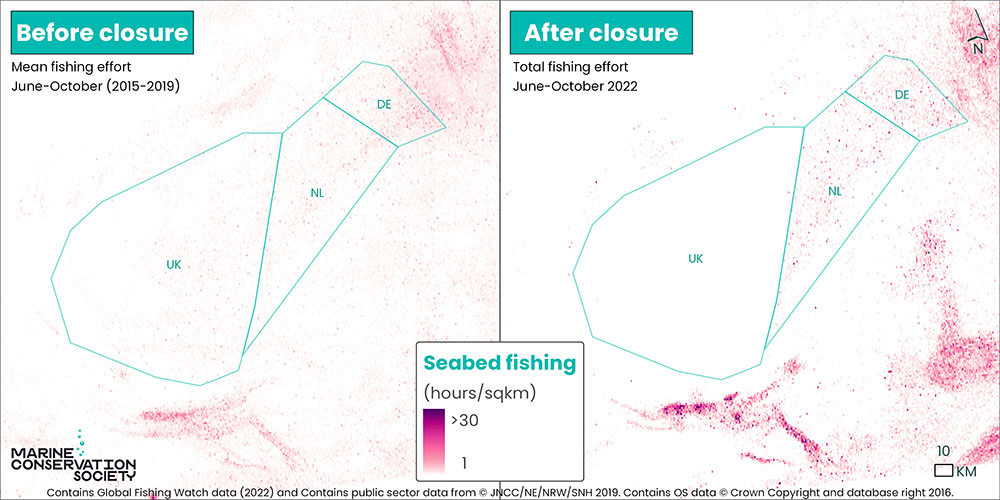
Analysis by the Marine Conservation Society (MCS) has found that there has been a 98 per cent decrease in bottom-towed fishing in the UK’s Dogger Bank Marine Protected Area (MPA), following a ban introduced by the UK Government in 2022.
Located in the North Sea, almost equidistant between the UK and Denmark, Dogger Bank has been a prime fishing ground for centuries. With a total area of some 7,600 sq km (6,800 sq mi), it is shared between British, Dutch, Danish and German fishing industries, and is home to a variety of important species such as halibut, cod and angelshark, populations of which have been severely depleted by overfishing.
Bottom-trawling – the practice of towing huge nets across the bottom of the sea floor – can be ruinously destructive to important seafloor habitats, preventing fish stocks from recovering between seasons.


Observations taken between the months of June and October, 2015-2019, found that an average of 623 hours of bottom-towed fishing took place within the UK section of the MPA. Following the introduction of the bottom-fishing ban, fishing activity dropped to just 13 hours between June and October 2022 – a 98 per cent decrease over previous years.
MCS says that the analysis shows how effective the bylaws banning bottom-towed fishing in MPAs can be. The UK Government has committed to protecting all 40 of the UK’s MPAs by 2024. MCS says there is a ‘long way to go’ to reach that target, with just four MPAs having been included in the 2022 bottom-fishing ban.
‘The huge reduction in seabed fishing we’ve identified shows how effective governments can be in protecting our ocean,’ said Jean-Luc Solandt, Principal MPA Specialist at the Marine Conservation Society. ‘This needs to be replicated across all offshore MPAs to help recover fish stocks, provide sanctuary for marine life, and protect sensitive habitats from destruction.’
‘Our ocean has an incredible ability to recover when it’s given a chance,’ said Solandt. ‘The Government must meet its target to fully protect all English offshore MPAs before 2024. The sooner this happens, the sooner our seas can restore themselves.’
In order to extend further protections to UK fish stocks, MCS has also partnered with the World Wide Fund for Nature (WWF) and Royal Society for the Protection of Birds (RSPB), working together as the Future Fisheries Alliance (FFA) to campaign for the implementation of Remote Electronic Monitoring (REM) technology.
MCS says that Installing REM cameras on fishing boats will help scientists observe where boats are fishing, help reduce bycatch and prevent overfishing.
‘With the UN Conference on Biodiversity (COP15) currently taking place, world leaders must turn their attentions to urgently protecting our planet from nature loss,’ said Sandy Luk, Marine Conservation Society CEO. ‘If we’re to achieve 30 per cent of land and sea protected by 2030, our ocean cannot be forgotten. When our ocean is protected, habitats can recover and support the incredible diversity of life in our seas.’
While the bottom-towed fishing ban in the UK section of Dogger Bank has been greatly reduced, MCS says that its evidence shows fishing efforts continue to be high in adjacent Dutch and German sections. To address this, the charity is working with Seas at Risk,. a coalition of European NGOs campaigning for the protection of all European MPAs from the damage done by bottom trawling.


